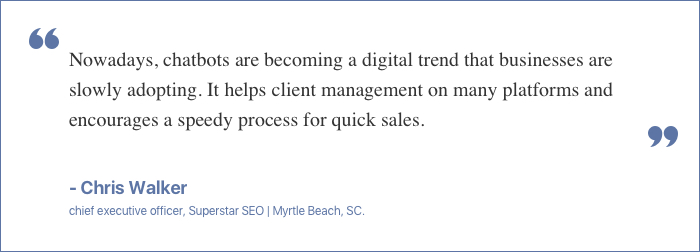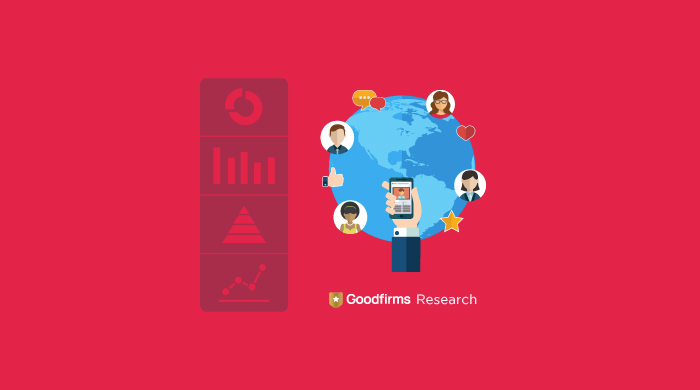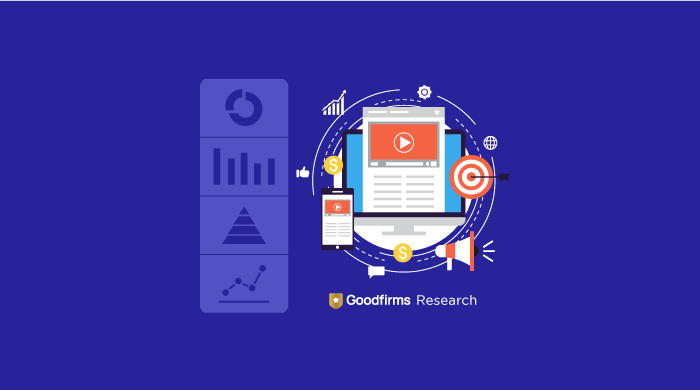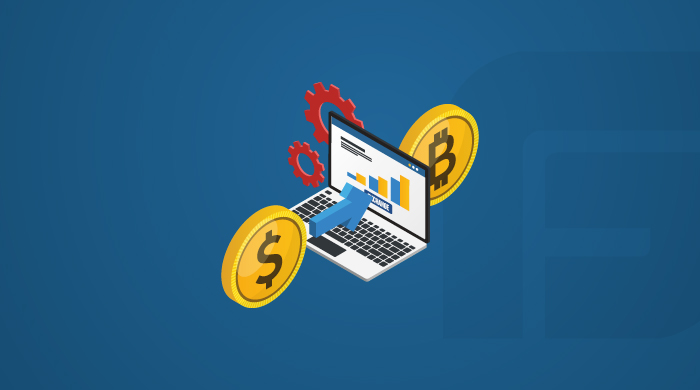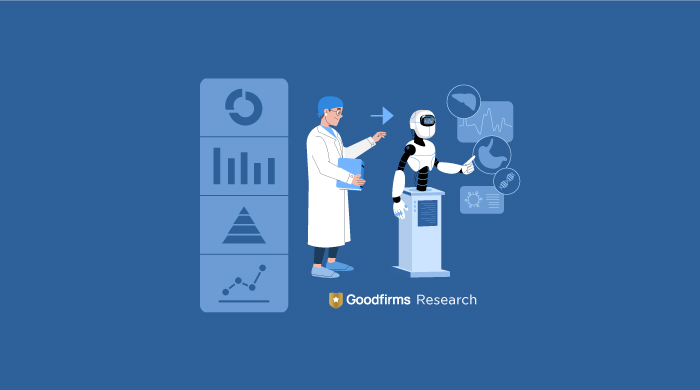ABSTRACT:
The Business-to-Business (B2B) landscape has changed drastically over the past years. The current B2B environment marks complex B2B relationships, increasing stakeholder expectations, customer-centric approaches, and process automation with intelligent tools. Traditional B2B models are not relevant in the shifting B2B ecosystem. New models that break B2B siloes and redefine collaboration are emerging with fast-paced digital enablement and intelligent cloud-based applications. While the B2B ecosystem is getting connected, there are still challenges related to data strategies, sales channels, marketing gaps, data silos, and hyper-competition in the B2B arena. With intelligent tools and data-powered insights, B2B organizations are beating the competition, mitigating challenges, and preparing themselves for future opportunities.
Goodfirms' research attempts to capture the transformation the B2B industry has been going through recently. The survey conducted between 7th August 2022 to 18th August 2022 queried B2B industry participants (B2B buyers, B2B sellers, and experts) across the globe to identify and analyze the current state of B2B services. A total of 410 B2B participants responded to the survey. The survey uncovers the latest B2B buyer trends, and seller innovations, and also finds out how the deployment of key intelligent technologies in the industry is helping B2Bs in streamlining processes and providing exceptional customer experiences.
Table of Contents:
Introduction
Survey Results and Data Analysis
- The Reputation of the Business is the Most Critical Factor that Influences 30.2% B2B buyers in Selecting a Specific B2B service
- Price Disagreement is the Top Reason that Delays the B2B Buying Process
- Vendor’s Ability to Provide Relevant Information is Important for B2B Buyers
- Product features (26.2%), services and offerings (23.8%), and pricing structure (21.4%) are the most sought-after information on the service provider’s website
- 87.8% B2Bs Hail Social Media Content as the best B2B Marketing Strategy
- 88.4% B2Bs Transact Via Online Channels
- 52.4% B2B buyers Prefer Online Channels over Offline Channels to Buy from B2B sellers
- Email is the Most Preferred Channel to Reach B2B sellers
- Face to Face Meet is the Most Preferred Channel to interact and Close Deals With B2B Sellers
- 54.8% of B2B buyers state that finding genuine reviews of B2B services is a difficult task, as most reviews are inauthentic and unverified
- 59.5% of B2Bs assert that Personalized Experiences are Very Important
- 31% of B2B buyers say that most B2Bs fail to deliver on promises
- 66.7% B2B buyers Reported to have Collaborated With Startups
Top Factors that Matter the Most to B2B Buyers
- Pricing
- Features or Functionalities
- Seller’s Customer Service Availability
- Reviews
- Ease of Use
- Deployment Time
Competition in B2B Services and Key Challenges
- Over-Demanding Customers, Increased Operating Costs, and Pricing Pressure are the top three Challenges Faced by B2B Sellers
- B2B buyers expect ultra-convenience
- B2B Buyers Demand Sustainable Products
- Collecting Data for Offering Hyper-personalized Buying Journeys
- Increased Operating Costs
- Pricing Pressures Due to Heavy Competition
- Too Much Data (Unstructured, Siloed, Fragmented) that is Difficult to Analyze
- Connecting With B2B Prospects Amidst Their Busy Schedules
Introduction
Business-to-Business (B2B) relationships are complex. Business deals in B2B take time to close with multi-level decision makings and complex purchase/sales procedures. Also, the quantum of money involved in B2B dealings is often more than B2Cs. At the same time, the pressure to provide richer customer experiences is more than ever on B2B service providers. Post-pandemic, there are concrete changes in customer preferences and behaviors. Amidst changing business environments, B2Bs are trying to stay ahead of the competition by implementing intelligent tools and automated processes.
Goodfirms’ survey titled: ‘B2B services: Intelligence, Competition, and Future’ attempts to provide valuable insights related to the current state of B2B services, including buyer trends, competition, challenges, and outlook. The research findings will help B2B players better understand the current market situation, customer preferences, growth prospects, and intelligent technologies that power B2B businesses.
Survey Results and Data Analysis
In August 2022, Goodfirms conducted an online survey to explore and evaluate the maturity of B2B services concerning intelligence practices and competitive strategies. The survey queried B2B stakeholders (the buyers, sellers, and experts) on their current business practices, approach, and strategies.
The Reputation of the Business is the Most Critical Factor that Influences 30.2% B2B buyers in Selecting a Specific B2B service
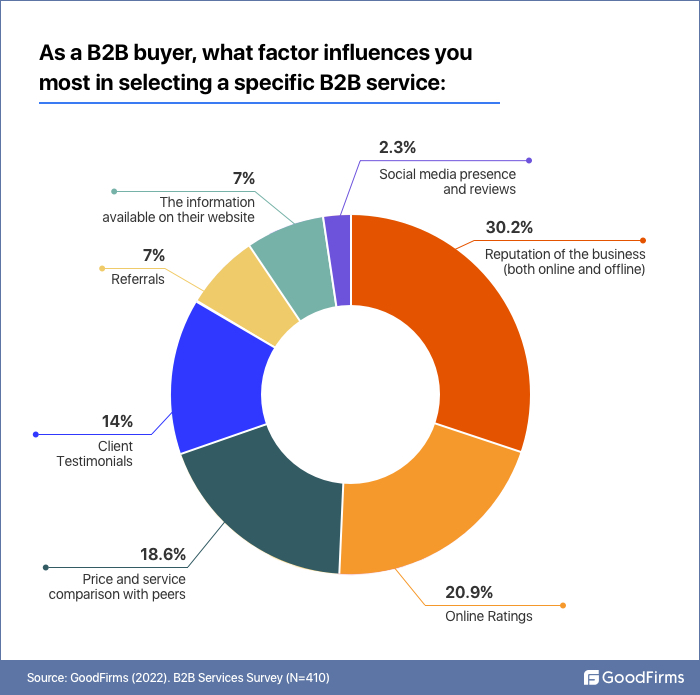
30.2% B2B buyers consider the reputation of a business as the most important factor influencing them to select a specific B2B service:
In the fast-moving B2B world, bagging the pole position depends a lot on the reputation of the businesses. Brand reputation (both online and offline) influences B2B buying decisions. The B2B context has gone global; therefore, to compete, B2Bs need to differentiate their brands to gain consumer trust. Goodfirms’ research found that reputation functions to create a valuable attribute that is critical for selecting a specific B2B service for 30.2% of surveyees.
Reputation directly impacts the perception of brand services, and B2Bs with high-reputational quotients are perceived to provide superior services. Another reason for this preference is that businesses do not want to associate themselves with other B2Bs with a shady reputation.
20.9% state online ratings are critical for selecting a specific B2B service:
Online ratings and reviews highlight the positive, negative, and dark elements associated with any B2B product or service. B2B buyers get valuable insights from ratings, which helps them set realistic expectations about the services compared to the advertised ones. Online ratings help B2B buyers in making complex decisions. Genuine and authentic user-generated content such as online reviews and ratings provides more sense of credibility to B2B buyers than core marketing content developed by the sellers.
18.6% B2B companies consider pricing analysis with peers as an important criterion in selecting a B2B service:
As peer pricing comparison is one of the focus areas for B2B buyers, B2B sellers need to create a standard mechanism to set their pricing structure. While high pricing can affect sales, low will impact the bottom line; therefore, keeping the equilibrium is critical. B2B sellers can use statistical analysis techniques such as SIMALTO and Conjoint analysis for effectively pricing their products and offerings.
Conjoint analysis is a method of analyzing the preferences of individuals, groups, or organizations to determine how they compare across attributes. In general, conjoint analysis involves looking at the relationship between two or more variables.(1) The goal is to understand why an individual prefers one option over another and how that preference can be used to inform pricing structure. Simultaneous Multi-attribute Trade-off (SIMALTO) analysis is the technique of determining attributes that people weigh upon for buying decisions.(2) Other techniques include regression analysis, monadic price testing, etc.
14% of B2B buyers consider Client Testimonials for selecting B2B Services:
Authentic testimonials can delight B2B buyers. Testimonials enlighten, inform and shape the perception of B2B buyers. They provide a snapshot of the B2B services and possess a convincing factor that drives B2B conversions. From humanizing brands to providing social proof, testimonials add the required credibility and trust that increases conversions.
Apart from the above factors, referrals (7%), information available on the website (7%), and social media presence and reviews (2.4%) are other factors that influence B2B buyers in finalizing a B2B service.
Price Disagreement is the Top Reason that Delays the B2B Buying Process
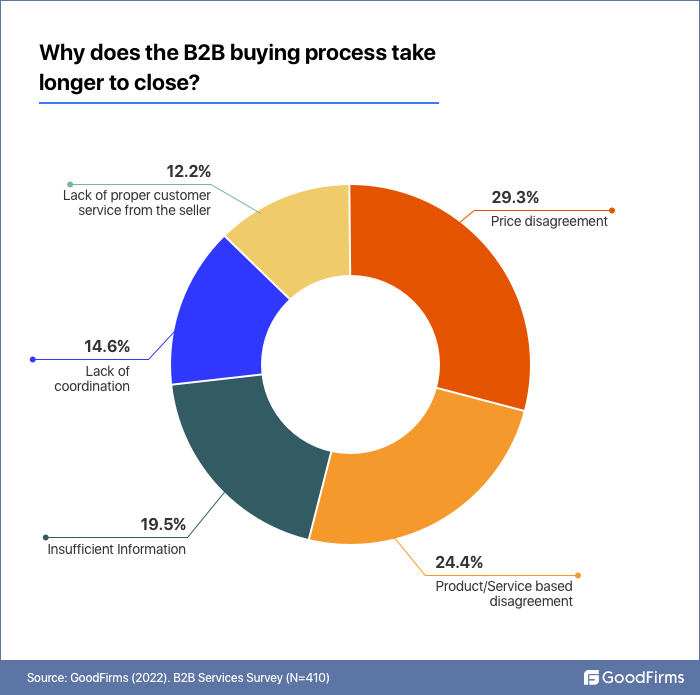
29.3% B2B buyers state that price disagreements delay the buying process
B2Bs face a significant amount of pressure when it comes to price. Price negotiations are often met with resistance and objections from both parties. These two factors can dampen the buying process.
“Compared to B2C sales, the typical B2B buying cycle is frequently lengthier. This frequently occurs as a result of several decision-makers and more complicated price negotiations,” says Dean Lee, Head of Marketing at Sealions.
For 24.4% B2B buyers, product/service-based disagreements are the cause of delay in the buying process.
Product/Service-based disagreements are a common cause of delay in the B2B buying process. These disputes arise when the service provider and the buyer disagree on certain terms such as product/service costs, delivery dates, extra services, features, responsibilities, etc. Sometimes, the service provider may be unwilling to accommodate a change that the buyer wants, or in a few situations, the buyers are not able to agree on payment terms notified by sellers.
19.5% blame insufficient information for longer B2B buying processes:
Companies today have a much more complex set of requirements when it comes to purchasing B2B products and services. Due to the increased complexity of modern business processes, B2B buyers need more information, data, and clarifications. B2B buyers are looking for a wide range of data about the products and services offered when choosing a vendor. The whole exercise is to find a reliable and trustworthy vendor.
This can be difficult, as many B2B sellers and B2B buyers are reluctant to share sensitive information with each other. This creates a dearth of information and leads to a deadlock.
14.6% B2B buyers say that buying process takes longer to close due to the lack of coordination:
B2B deals require buyer and seller communication across multiple departments, including sales, marketing, and finance, which makes it difficult to coordinate the necessary tasks. As a result, B2Bs are more likely to take longer to close their deal than B2Cs. The long waiting times can lead to higher costs for both buyers and sellers. For closing deals quickly, seamless coordination between B2B buyers and sellers is necessary. B2B buyers and sellers can achieve this by implementing combined processes, structures, mechanisms, and people in place to enable real-time responses and information sharing.
12.2% find lack of proper customer service from the seller as the culprit behind delays in closing B2B deals:
Goodfirms' survey reveals that lack of proper customer service from the seller’s side is also the culprit behind delays in closing B2B deals. 12.2% of business-to-business buyers report having experienced problems with the seller's customer service. Many sellers fail to properly train their salespeople to support customers and resolve issues if they arise. This is an especially big problem for smaller companies that may struggle to keep up with customer demands.
Vendor’s Ability to Provide Relevant Information is Important for B2B Buyers
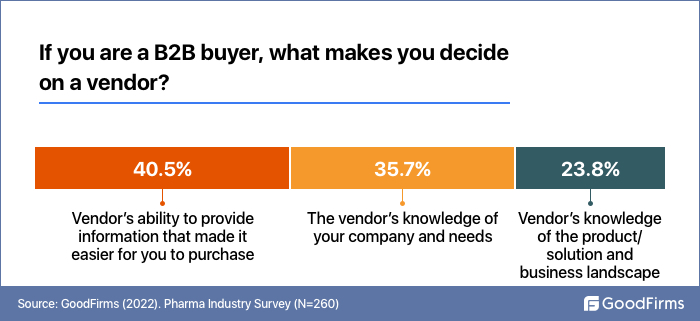
40.5% B2B buyers choose vendors that provide relevant information that makes purchase decisions easier:
The ability of the vendor to better explain the products and services results in a powerful sales pitch. This provides B2B buyers with a complete idea of the offerings. Trained vendors with sound product knowledge and skills help B2B buyers make informed decisions without painstaking efforts.
However, to provide the most valid and relevant information, vendors need to keep abreast of the latest trends, product specifications, service alterations, changes in buyer preferences, etc. Vendors that keep data organized and clean are better positioned to personalize communication and provide accurate information that buyers value.
One of our biggest challenges as a B2B seller is ensuring that our CRM and sales activities are in sync. We keep on top of this by utilizing deduplication and data cleaning tools integrated with our CRM. This helps us ensure our prospecting data is as accurate and up-to-date as possible to be more efficient with our outreach. It also helps us personalize our communications better, Says Matthew Debbage, COO of Creditsafe & CEO of Creditsafe Asia and Americas.
35.7% B2B buyers consider vendors’ knowledge of their (B2B buyer’s) company and need before choosing them.
When searching for the right B2B vendors, 35.7% of buyers consider the vendor's knowledge of their company and needs as a selection criterion. The vendor's knowledge of the buyer's company projects the personalized approach of the vendor. Vendors that thoroughly understand the specific company needs of buyers can provide accurate timeframes, a fair budget estimate, and the most effective solutions.
23.8% consider the vendor's knowledge of the product/solution and the business landscape
Vendors' knowledge of the products and solutions that they offer, along with a comprehensive understanding of the current business landscape, is the vendor selection criteria for 23.8% B2B buyers. B2Bs want to make sure that the vendors understand their business and have the ability to meet their unique needs.
Product features (26.2%), services and offerings (23.8%), and pricing structure (21.4%) are the most sought-after information on the service provider’s website
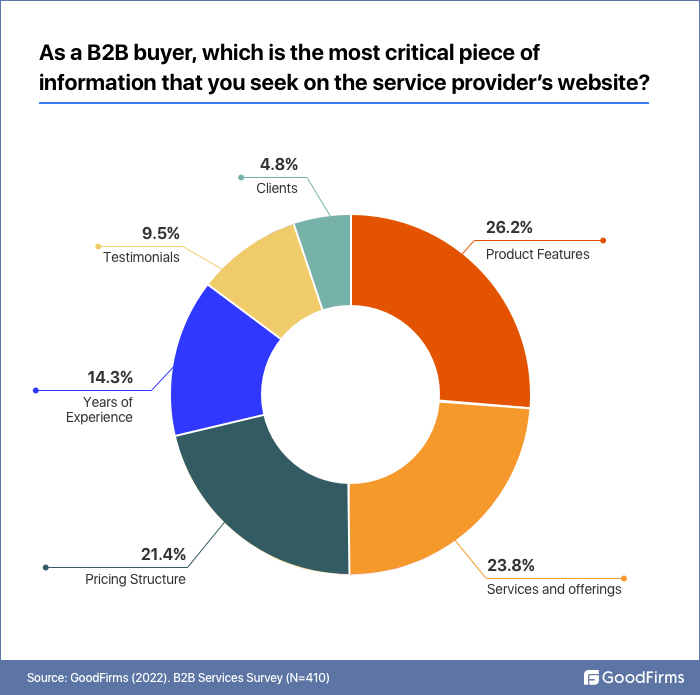
The website has become an integral part of businesses. B2B buyers generally have competent procurement departments and research teams that comprehensively analyze services/products before contacting the B2B sellers. Equipped with meticulously analyzed data, most B2Bs clearly understand their precise requirements. Most of the research is carried out online, and the seller's website is the primary source of research. “More marketing choices are being made using online behavioral data. Much more than demographic and transactional data, web interactions offer priceless insights into consumer behavior,” says Jason McMahon, Digital Strategist, Bambrick.
Product features and Service offerings are the most sought-after piece of information on service B2B sellers' websites, with 26.2% and 23.8% responses, respectively:
For any B2B Company, its digital presence via a website stands as the potential method to promote the brand, display the products and services, and create a chance to win leads from online visitors. By providing detailed information about product features and service offerings, B2B businesses can attract more customers, build trust, and increase sales. B2B service providers should provide complete information about the company's products and services engagingly so that visitors can make informed decisions when they browse their sites.
21.4% B2B buyers seek pricing information on the seller's website:
There are many ways to boost the number of leads into the B2B sales funnel through the website. A great place to begin is by including a pricing page that is clear and easy to locate. B2B companies that opt not to create a pricing page and instead ask prospects to contact the company for pricing information may delay their sales or put their sales pipeline in the risky zone. Calls-to-action that asks buyers to contact the sales when they want to know the pricing is an ineffective practice. Having an appropriately defined pricing page with variable pricing models and a clear pricing structure can positively impact sales.
14.3% B2B buyers seek firmographics such as ‘Years of Experience of the Seller’ on their website:
Firmographics are attributes pertaining to organizations that include years in business, market share, number of employees, number of service locations, associated vendors, etc.(3) B2Bs use firmographics (like how B2Cs use demographics) to target their customers. Firmographics help B2Bs prioritize, personalize, and finalize their collaborations with other B2Bs. When attempting to contact a B2B entity, B2B sellers look to work with an established corporation, and in this context, the total number of years B2Bs have been in operation helps buyers evaluate their status and expertise.
9.5% B2Bs look for testimonials, and 4.5% search for clients on the seller's website:
B2Bs that wish to boost the credibility of their products and service must include client testimonials on their website. Testimonials serve as a strategic measurement of a B2B brand's customer satisfaction quotient. Testimonial endorsements in the form of quotes, videos, reviews, case studies, etc., can help potential customers form an image of B2B products and customer service. Along with testimonials, mention of current clients and their brand names can help project B2B’s authenticity and stature.
87.8% B2Bs Hail Social Media Content as the best B2B Marketing Strategy
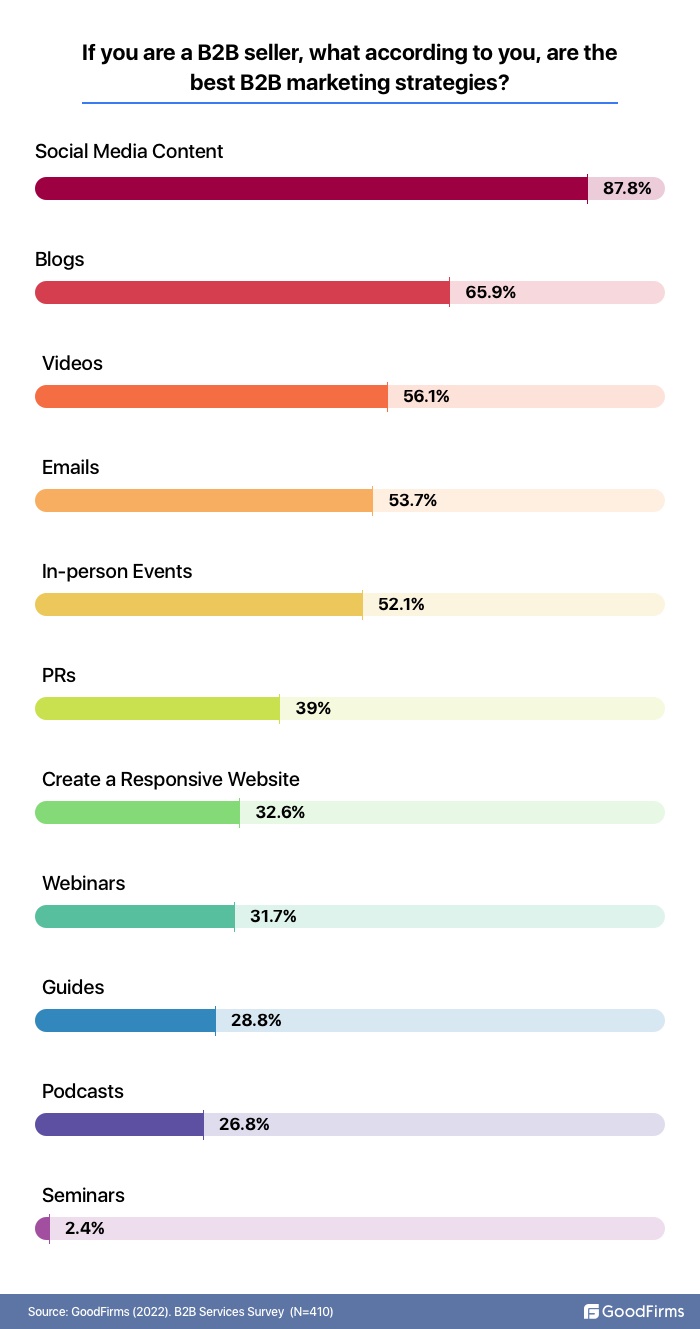
Social Media Content Marketing is hailed as the best B2B marketing strategy by B2B Sellers
Social media content marketing plays strategic and tactical roles in connecting the brand with the right followers. Social media platforms can be leveraged to advertise, generate value, enhance customer relationship management and sentiment analysis, instigate interactions with prospects, and connect to brands.
Social media content’s variety, diversity, and intensity help B2Bs build brand resonance, brand equity, and brand judgments in real-time.
Social media content reaches different audiences, extends beyond local geographic boundaries, and bolsters brand awareness. It is the potential outlet for B2B marketers to build connections with prospects and generate more qualified leads.
65.9% credit ‘blogs’ as the best B2B marketing strategy:
Incorporating blogs into a B2B marketing strategy can bring more engagement, traffic, and leads to businesses. Custom visuals, infographics, and other audio-visual resources embedded in blogs provide the right content mix that drives more engagement. B2B blogging helps sellers reach potential B2B customers. Blogs have SEO benefits and improve site rankings for online B2Bs by building backlinks. Blogs can also be repurposed into other marketing content forms such as videos, audio, infographics, FAQs, etc.
Videos appeal to 56.1% B2Bs as the most powerful B2B marketing strategies:
B2Bs can use videos to share their product or service offerings, market promotions, and upcoming events. Short Videos, Reels, are an effective way to market and tell compelling stories to B2Bs. By creating and sharing videos, B2Bs can connect with potential customers and build trust that could lead to future sales. There are legitimate concerns related to video creations for marketing, such as expensiveness, time-consuming processes, the requirement for more technical support and resources, etc. However, videos have inherent value as strong marketing assets, and any investments will bring considerable ROIs.
53.7% B2Bs state emails as the best option for marketing content:
Targeted, personal, and interactive email marketing is one of the most effective ways to reach B2B audiences and drive sales. Email is an ideal and professional tool for B2B companies, and email open rates are higher than social media clicks.(4)
52.1% B2Bs consider in-person events as the best option for marketing:
In-person events such as trade fairs, conferences, seminars, corporate events, etc., can help make connections with potential customers and build trust. In-person events are usually best for business-to-business marketing since B2Bs are more likely to respond to them.
39% B2Bs say that PRs are powerful marketing strategies
A PR strategy involves a wide range of activities, including research and planning, outreach, media relations, press releases, and social media. By taking advantage of the right mix of these tactics, B2Bs create an effective PR strategy that helps them reach new customers, market and promote B2B products, grow their business, improve brand awareness and build customer loyalty. Quality PRs can lead to high-quality media coverage that boosts visibility for B2B businesses.
32.6% B2Bs believe that creating a responsive website is the best marketing strategy
With ease of use and compatibility with diverse devices, responsive websites get more engagement and higher search engine rankings. Creating a responsive website with strategically placed call-to-action buttons can bring multiple marketing benefits for organizations.
31.7% B2Bs consider webinars as the most effective marketing strategy:
Webinar allows businesses to create customized, engaging, and affordable marketing events for the target audience. By gathering experts for insightful discussions, B2Bs can use Webinars as a great way to create trust among customers. B2B sellers can collect valuable data from the attendees - which can help them optimize future marketing campaigns. Webinars are scalable at lower costs than other marketing strategies.
28.8% B2Bs consider Guides as effective marketing strategies:
Guides such as buyer's guides, pricing guides, step-by-step guides, how-to-use guides, etc., are powerful B2B marketing tools to educate B2B buyers and show expertise. A buyer guide showcases unique selling points and builds trust by showing that the B2B business is knowledgeable and experienced in its field. Guides serve as an effective call to action for visitors to take action by signing up for B2Bs’ newsletter.
26.8% B2Bs consider Podcasts as an effective marketing strategy:
Podcasts with relevant content are an important part of B2B marketing. Podcasts help businesses build community, reach decision makers, project thought leadership, create scalable content resources, and increase brand awareness.
2.4% B2Bs consider Seminars as effective marketing strategies:
Seminars are an effective way to engage with B2B buyers and an opportunity to showcase products and services. Seminars can be a great way to build brand credibility and B2B network. It also allows B2Bs to gather feedback from potential customers.
88.4% B2Bs Transact Via Online Channels
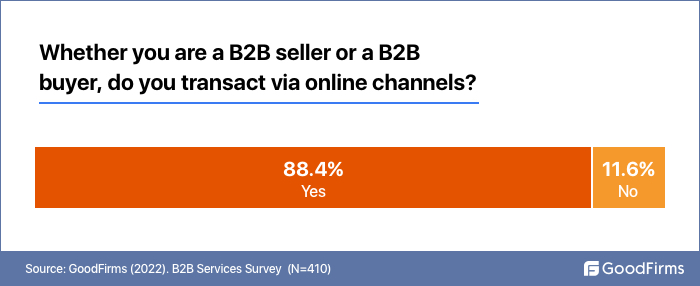
52.4% B2B buyers Prefer Online Transactions to Buy from B2B sellers
While 88.4% B2Bs (including buyers and sellers) transact via online channels, 52.4% of B2B Buyers favor online B2B transactions over offline ones. Online platforms are the most popular route for buyers to place B2B orders. Modern B2B buyers are utilizing online channels for a baseline level of convenience and speed. Digital channels are growing every year. 80% of B2B sales interactions will occur via digital channels by 2025.(5) With the rise of omnichannel buying modes, traditional B2B sales channels are becoming obsolete.
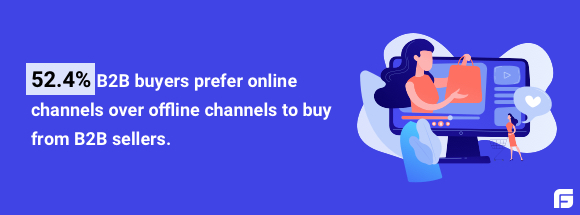
B2B buyers expect a seamless omnichannel experience from suppliers.
Whether buyers are buying from a website or via a call center representative, they want to feel like they're doing business with a single contact point, and as the B2B buying landscape continues to evolve digitally, buyers have more options than ever to find the best product for their needs. As a result, B2B suppliers need to be prepared to offer a robust omnichannel experience that will support all buyer touchpoints. This can include offering multiple buying channels, same-day shipping options, in-store pick-up options, and better customer service support.
Email is the Most Preferred Channel to Reach B2B sellers
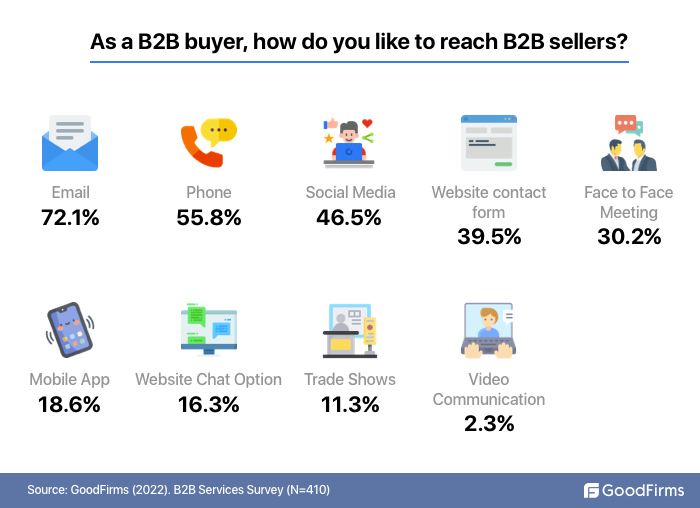
72.1% of B2B buyers prefer to reach sellers via email. Goodfirms surveyed B2B buyers about their most preferred channel to reach sellers. Email emerged to be the most preferred channel for B2B buyers to reach out to businesses. Email is considered to be more professional than other channels like social media and text messaging. 55.8% of B2B buyers prefer to reach sellers via phone. The phone is one of the most commonly used ways to reach out to business-to-business (B2B) sellers.
Social Media is the preferred medium to reach B2B sellers for 46.5% B2B buyers. Social media direct messaging has become an important tool for B2B businesses that want to reach out to sellers. It allows companies to send targeted messages directly to multiple sellers for quotes. 39.5% of B2B buyers would like to reach sellers via the Website contact form. The importance of website contact forms cannot be overstated. They allow B2Bs to engage with sellers with a message and their contact information. 18.6% B2Bs chose mobile apps to contact B2B sellers. Mobile Apps are a convenient way to reach B2B sellers. B2B buyers can download the app and select service options.
16.3% of B2B buyers prefer to reach sellers via the Website chat Option. Chatbots are an essential tool for B2B businesses. They're a great way to engage with customers and provide them with information in real time.
Face-to-Face Meeting is the preferred medium to reach B2B sellers for 30.2% B2B buyers. Face-to-face meetings are an important part of B2B business relationships. They allow businesses to establish a rapport with sellers that is difficult to achieve through electronic communication. B2B stakeholders trust each other more when they are face to face. Face-to-face meetings also have the benefit of being more engaging with interactions that feel more personal and authentic. Trade shows (11.3%), and video communication (2.3%) are other channels used by B2B buyers to reach sellers.
Face to Face Meet is the Most Preferred Channel to interact and Close Deals With B2B Sellers
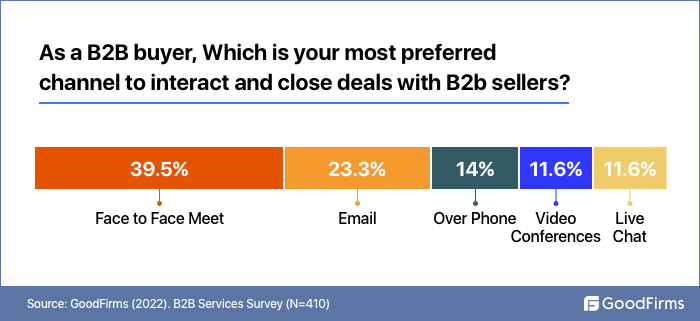
39.5% B2B buyers prefer interacting and closing deals in Face to Face Meet
The average B2B buyer has a much higher need for face-to-face interaction than a consumer. They prefer to meet face to face in order to build trust and credibility with the potential supplier. Another advantage of meeting in person is that it allows the buyer and seller to have more time to discuss their needs and discover any hidden details that may be relevant to the negotiation.
Furthermore, it enables them to make more informed decisions when it comes to choosing a supplier. B2Bs that keep teams ready and prepared for an in-person meeting ensure marketing materials are up-to-date and ready for distribution and can close deals quickly.
23.3% B2B buyers will interact, and close deals via email
Email communication plays a key role in business-to-business deals. It enables parties to exchange information, share documents, provide legal consent, clarify misunderstandings, and reach an agreement. Email communication is private and secure, cost-effective, and without any delivery delay.
14% B2B buyers prefer to interact and close deals over the phone.
Phone communication is considered reliable by 14% of B2Bs to close deals with B2B sellers. Phone communication is quick, trustworthy, and time-efficient.
11.6% find video conferencing as a better channel to interact and close deals
For 11.6% of buyers, video conferencing is time-efficient for setting up meetings with B2B sellers. For deals that need presentations, video conferencing is a better option.
11.6% find Live as a better channel to interact
Live chat provides significant benefits for businesses, as it allows them to get immediate attention and respond to questions quickly and easily.
54.8% of B2B buyers state that finding genuine reviews of B2B services is a difficult task, as most reviews are inauthentic and unverified
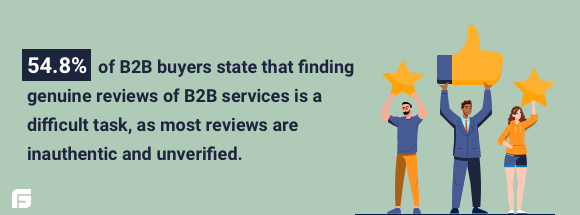
B2B reviews have always been a bit of a hot topic in the marketing world. More than half B2B buyers believe B2B reviews are often unreliable and simply not representative of the real world. Inauthentic reviews come from customers who haven't actually used the product or service being reviewed.
Unverified reviews are another issue entirely. These are reviews from customers who haven't provided proof that they've actually used the product or service being reviewed. It's important to keep both these types of reviews in mind when evaluating B2B companies and products.
59.5% of B2Bs assert that Personalized Experiences are Very Important
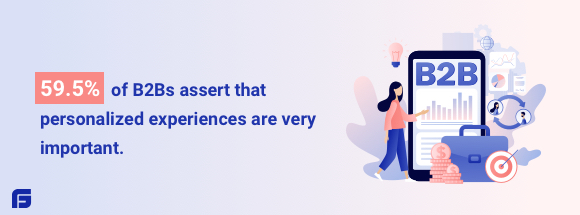
Modern B2B enterprises are rendering themselves more customer-centric and are engineering world-class customer experiences. The sales processes and buying journeys are experiencing metamorphic changes. B2Bs are reconfiguring value chains in favor of the customer. Personalized experiences are gaining popularity in the B2B industry as more and more consumers crave products that cater to their needs. By understanding buyer expectations, B2Bs are tailoring their communication, products, offerings, and customer services to create personalized experiences that resonate with the buyers.
Personalized experiences provide B2B buyers with tailored items that are crafted around their unique business needs. B2Bs can leverage personalized experiences to build trust among consumers, drive sales, and grow brand loyalty. In addition to building trust among consumers, personalized experiences can also help B2Bs increase sales by customizing product recommendations and price points.
The modern web-savvy B2B buyer expects an exceptional personalized user experience and support across multiple interaction touchpoints.
31% of B2B buyers say that most B2Bs fail to deliver on promises
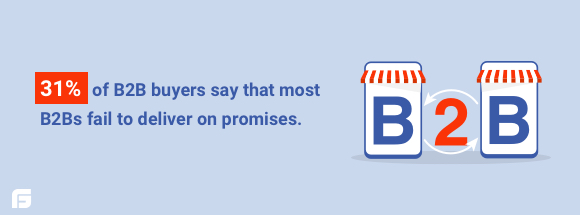
B2B buyers expect a high level of customer service from B2B sellers. B2B buyers also want to be able to see how their products and services are performing, so they want access to real-time data. Poor planning, bad management, wrong decisions, and over-commitments can cause businesses to fail to meet their goals. B2Bs that work with reliable partners and vendors By can minimize the chances of failure and ensure that their projects are completed successfully.
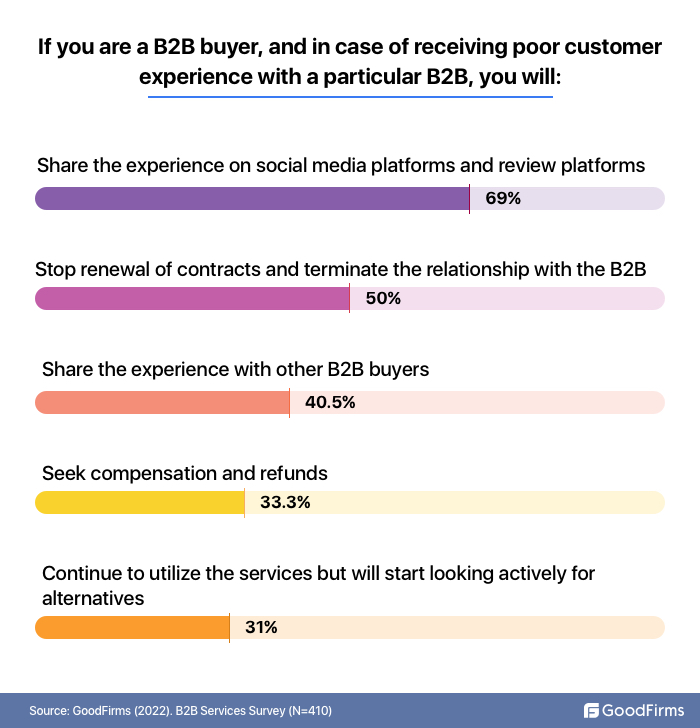
69% B2B buyers will share a poor customer experience on Social media/Review Platforms. The propensity to share a poor customer experience with a B2B service provider on social media and review platforms is higher among B2B buyers in the age group 18-25 (57.6%) and 25-39 (42.5%). Generation Y, or millennials, are more likely to share their experience on social media and review platforms.
50% B2Bs will stop the renewal of contracts and terminate the relationship with the B2Bs for poor customer service. Poor customer experience is one of the main reasons why B2B customers will terminate their relationship with a business.
40.5% will share the bad experience with peers. 33.3% B2B surveyees said they would ask for refunds and compensation if they are not satisfied with services.
31% of B2Bs said that if faced with a poor customer service situation, they will switch suppliers after finding a better alternative.
In addition to lost revenue, unhappy customers may also take their business elsewhere. To avoid these issues, B2B sellers must ensure that they are providing a consistently high-quality customer experience. B2B service providers should be well-equipped to answer customer questions quickly via phone or email. They also need to have enough staff on hand to handle peak demand periods. By doing so, they can avoid having angry customers storm out of their business in frustration.
66.7% B2B buyers Reported to have Collaborated With Startups:
Contemporary startups are highly innovative companies that bring new insights, processes, and advanced tools that help B2Bs to be more competitive. Healthy partnerships with startups, especially the tech startups help B2Bs unleash their full potential in areas where they may lack expertise.
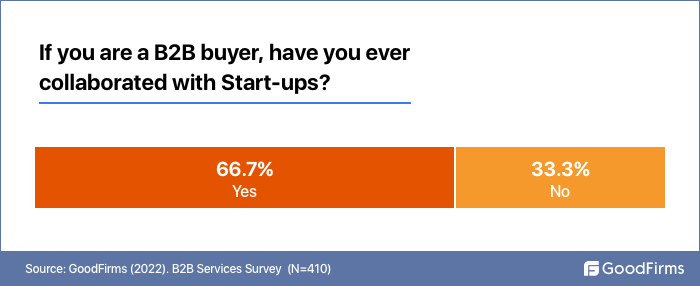
Top Factors that Matter the Most to B2B Buyers
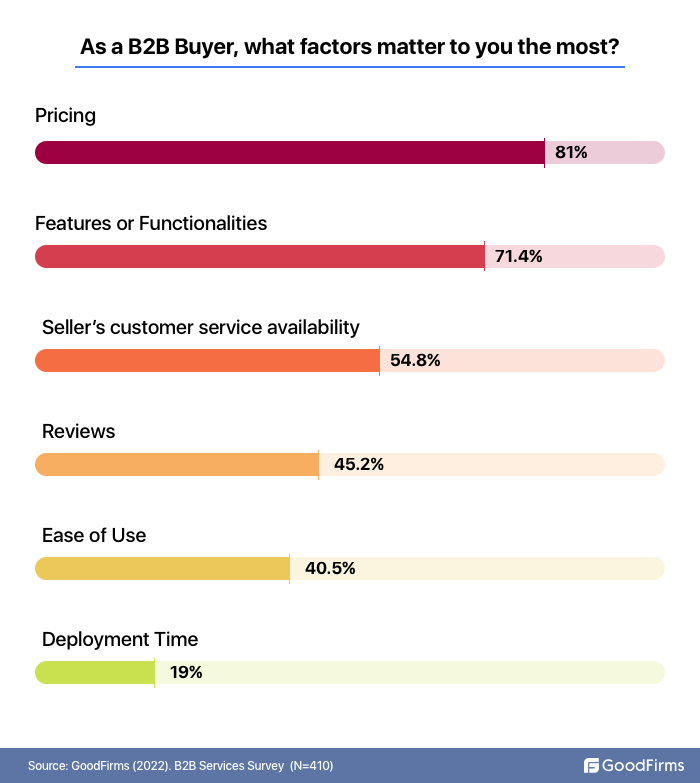
Pricing
81% B2B buyers consider price when making a purchase decision. The B2B audience is price sensitive. Customers can now build a personalized product solution and generate a price quotation using support tools from many technical product and solutions providers. Pricing is an important part of any B2B sales process. When done right, pricing can help sellers to identify the right fit between products and customers' needs. It can also improve the value they offer and increase sales by aligning the price with the perceived value of their solution.
Features or Functionalities
71.4% B2B buyers indicated features and functionalities as the top factors that matter while selecting B2B sellers. Features communicate the capability, utility, intangible and tangible benefits, attributes, and value of a product or service. Features and functionalities separate products from each other and are important for comparing two or more distinct B2B services. Features are also critical for deciding the prices of B2B services or products.
Seller’s Customer Service Availability
The B2B buyers aspire to engage with businesses that act like trusted advisors. Sellers' customer service must be efficient in addressing B2B buyers' unique needs and motivations. Customized service with the ability to configure products exactly to agreed specifications and reliable real-time customer service options are top factors that matter to 54.8% B2B buyers. Every customer service interaction the B2B buyer has with the seller is an opportunity to build a trusted relationship.
Reviews
B2B reviews are important for B2B businesses of all sizes. By getting positive feedback from customers, B2B sellers can improve their company's image. B2B reviews can also help them attract new customers. By using B2B review sites,(6) sellers can connect with potential customers and get their feedback. B2B reviews can lead to improvements in customer satisfaction and loyalty. 45.2% B2B buyers select reviews as an important factor that matters to them in choosing a B2B service provider.
Ease of Use
There is little difference when it comes to B2B consumers and B2C consumers. Ease of use scores highly for B2Bs, too, and our findings resonate with other studies(7) that have reported B2Bs switching sellers during and in the aftermath of the pandemic. Simplifying product/service usage is critical for B2B sellers as 40.5 % B2B buyers report ease of use as an important factor that matters to them.
Deployment Time
19% B2B buyers choose deployment time as a factor that affects them the most. Faster processes are examples of better buying experiences. B2B sellers that have frictionless policies, processes, and third-party collaborations are better positioned to deliver faster services. From swift quotes to quick approvals, B2B buyers expect expedited processes and no-delay deployment. B2B sellers should keep processes simple and use automation, cloud computing, and other technologies to shorten the deployment cycles.
Competition in B2B Services and Key Challenges
Over-Demanding Customers, Increased Operating Costs, and Pricing Pressure are the top three Challenges Faced by B2B Sellers
B2B buyers expect ultra-convenience:
Convenience is the most profitable theme B2B sellers can bank upon to keep their customers glued to their services and products. Convenience to buying from offline and online channels, the comfort of payment via multiple channels, the facility of faster and seamless deliveries/checkouts, and grievance redressal without hassle are key areas B2Bs can differentiate themselves from their peers.
B2B Buyers Demand Sustainable Products
B2Bs need to project themselves as the champions of sustainability by offering products that are durable, green, and made from non-polluting processes. Sustainability is a term that comes up quite a lot in the world of B2B marketing. B2Bs need to be aware of how their products are made and use sustainable materials to create a reputation as a champion of sustainability.
Collecting Data for Offering Hyper-personalized Buying Journeys
B2B buyers are demanding personalized services like never before. Meaningful insights are critical for delivering personalized services. Quality data can provide the required business acumen to B2Bs for delivering quality services. However, B2Bs need to generate, collect, store, manage, and analyze a huge amount of high-quality data to create meaningful insights. This is challenging. However, proactive B2Bs are deploying the most advanced tools and intelligent technologies to nurture and transform data into actionable insights.
Increased Operating Costs
B2B businesses need to spend a lot of time and money on marketing their products. Key operating costs in a B2B business include marketing costs, payroll, office rent, advertising, and customer acquisition costs. B2Bs are experiencing contemporary challenges such as growing logistics costs, employee compensation, and increased office space rates.
Pricing Pressures Due to Heavy Competition
B2Bs are constantly under pressure to keep prices low in order to attract customers and compete with other sellers. When there is more than one seller on a marketplace, each seller tries to undercut the others in order to get more customers. This can lead to oversupply in some product categories and shortages in others, which can make it harder for B2Bs to sell their products. B2Bs may have competitive pricing power when their offer is more appealing to B2B customers than competitors' offers.
Too Much Data (Unstructured, Siloed, Fragmented) that is Difficult to Analyze
B2B data is not intuitive to understand or interpret. B2B data is complicated. B2B data is the data that is generated and shared by businesses that are involved in business-to-business (B2B) transactions. B2B data is often used by companies in the form of customer information, such as purchase histories, sales revenue, product distribution, and contact details. B2B data, collected in many different ways, including through surveys and email blasts, provides insight into customer behavior and preferences. This can help B2Bs develop new products and services or refine their marketing campaigns. However, voluminous data has become a challenge for B2Bs, who find it difficult to analyze, manage, and utilize it in a purposeful way without a proper system.
“One of my company's biggest problems with B2B sales was having too much sales data. To begin with, you may monitor how B2B leads to engagement with your brand through various channels. For instance, the website pages they visit, how long they stay on each page, the interactions they have with your social media posts, and more. This much knowledge can lead to analysis paralysis. Defining the next course of action using data becomes challenging in this situation”, says Gary Hunter, Director, CompareGolfPrices
Considering the complexity of B2B buyers' preferences, the need to keep comprehensive data sets is higher than ever in the B2B service landscape. Siloed, unstructured, fragmented, incoherent, and ambiguous data ruins business prospects. Also, inconsistent, insufficient, and inaccessible data is useless for lead-generation purposes. If existing practices are not able to generate and deliver on data needs, new and more sophisticated solutions will be required.
Connecting With B2B Prospects Amidst Their Busy Schedules
B2B sales is a competitive industry that involves a lot of time and effort. Prospects are busy, and it can be hard to have an engaging conversation. Connecting with prospects when they're busy, scheduling a time to talk over the phone, setting up a meeting in person, etc., is overwhelming.
Connecting with prospects is the biggest challenge for us today. We generate leads from multiple channels, such as email, social media, and through our website, but convincing prospects to dedicate their time and get to know our service is the real struggle. We’ve identified the main causes of this to be heightened competition and our prospects’ busy schedules, says Milo Cruz, CMO Freelance Writing Jobs.
Other Challenges
There are other challenges, such as many B2Bs lag in the usage of key marketing and sales metrics, work with a limited budget, do not have high-quality or comprehensive data on prospects, etc. Such inadequacies and shortcomings will result in disastrous consequences for the sales cycle, including leads falling out of the sales funnel.
B2B Intelligence Tools Are Indispensable for B2Bs
B2B leaders have realized that 'intelligence' as a practice and strategy is critical to achieving competitive advantage. Mature B2Bs have already mastered sales and marketing intelligence and are now deploying intelligence in operations, customer service, logistics, and finances. Through virtual experiences, augmented reality, and simulated environments, B2Bs are educating customers. AI is powering a real, tangible, valuable, and practical impact on B2B's core functioning. By automating tasks and improving data quality, B2Bs are striving to increase sales staff satisfaction and productivity.
“We've used intelligence technology to fix issues of tracking leads through funnels, aligning sales and marketing teams, etc. The use of technology and streamlined processes means that businesses can close sales more quickly than ever before. This is a major advantage in today's competitive marketplace, where companies need to be able to move quickly to capitalize on new opportunities”, says Boris Jabes, CEO & Co-Founder of Census
Goodfirms’ surveyed B2Bs to find which intelligence tools and technologies they have deployed to optimize operations, drive revenue growth, and improve productivity. B2B businesses reported using B2B intelligence tools, like data analytics, market intelligence tools, web scraping tools, business intelligence tools, etc. for understanding their customers better and proactively identifying upcoming market trends.
Data Analytics Tools
Data Analytics tools are software tools that help businesses to collect, organize, and analyze data. These tools improve business decision-making by giving managers access to a wide range of information, predicting future trends and customer behavior, and optimizing their marketing campaigns and customer care. Data analytics tools are also useful for gathering insights into a company's operations. Data analytics tools have varied usage from monitoring employee productivity to detecting fraudulent activities. Data analytics tools are designed to help sales teams optimize their performance, generate leads, and enhance marketing campaigns.
"One of the biggest challenges faced by B2B sellers is generating leads. With fierce competition, it can be difficult to get noticed. That's where lead generation comes in. By using data and analytics tools to identify potential customers, B2B sellers can dramatically increase their chances of making a sale", Marcus Astin, Chief Operating Officer, Pala Leather.
AI-Powered Intelligence Tools
AI-powered intelligence tools offer a number of benefits, including the ability to automate repetitive tasks and provide real-time insights into customers' needs. AI-powered intelligence tools can focus on specific tasks, help companies optimize their operations, improve customer experience, and provide broader coverage across multiple areas.
"As a B2B seller, one of the top challenges companies face is the need to constantly keep up with the latest trends and intelligence to stay ahead of competitors. This can be a difficult and time-consuming task, as there is a lot of information to sift through and decipher. Companies are now turning to artificial intelligence (AI) to help them with this task. AI-powered tools can help identify patterns and trends much faster than humans can, making it an invaluable asset for any B2B seller looking to stay ahead of the competition, says Luke Lee, Founder of Ever Wallpaper.
AI-enabled Customer Relationship Management (CRM) Tools
These tools help businesses manage their relationships with customers by providing them with easy access to information about B2B customers and their purchases. They can be used for a variety of purposes, such as managing customer relationships by automatically notifying customers when they receive an order or shipment notification email or sending targeted offers to specific customers.
Marketing Automation Tools
These tools help businesses automate their marketing campaigns and streamline the process of running them across multiple channels. They can be used for a variety of purposes, such as automated email marketing campaigns so that they are sent at the optimal times and to the right people, automating social media campaigns so that they are posted at the optimal times, and to the right people; automating search engine optimization.
Web Scraping Tools and Intelligence Databases
Web scraping tools are software applications designed to extract relevant and targeted information from websites. These tools can also convert unstructured web data into structured sets. Intelligence databases collect and store insightful data for businesses.
"Our company faces unique challenges regarding intelligence gathering and keeping ahead of the competition. First and foremost is the need to constantly monitor massive data sources to identify potential new business opportunities. Fortunately, there are now many intelligence technologies that can help to stay ahead of the competition. These include Web scraping tools that can automatically collect data from a wide range of online sources. Intelligence databases provide detailed information about specific industries or markets", says John Brown, Financial Analyst, and Contributor at GetCash.com.
Market Intelligence Software
Market intelligence software is a suite of tools designed to help businesses gather information about their markets, customers, and competitors. Sales figures, production output data, debt ratios, and other key financial metrics are valuable information elements for competitor intelligence studies. Marketing intelligence tools can be used to understand trends in the market, track shifts in B2B consumer behavior, and identify potential new markets. Depending on its complexity, market intelligence software can gather data from different sources and analyze it for insights such as trends and predictions or provide business stakeholders with real-time insight into their operations.
As a business, it's important to stay ahead of the competition. One way to do this is by using intelligence technologies. At our company, we use a few different intelligence technologies to help us keep an edge on the competition. We use market intelligence software to track changes in the marketplace, competitive intelligence software to track what our competitors are doing, and social media monitoring tools to listen to what our customers are saying. Using these intelligence technologies, we're able to stay ahead of our competitors and maintain a strong position in our market, Oberon Copeland, Owner & CEO of veryinformed.com.
Future of B2B Services
The future landscape of B2B services is set to be guided by intelligent technologies and organizations focusing on personalization, customer experiences, and omnichannel deliveries. Buyer-seller relationships, interactions, and collaborations will be reimagined, and B2B organizations will get rid of siloed functions with a seamless flow of data between stakeholders.
“To grow your B2B brand, it is key to keep your focus; it is easy to get involved in a lot of strategies and media channels. You will keep growing your brand in the long term by keeping a laser focus, says Joran Hofman, Founder of getreditus.com.
Some of the prominent changes that the B2B landscape is getting prepared for are:
- B2B intelligence solutions are set for another spike in sales as more companies plan implementation.
- The future will see more B2Bs using competitive intelligence to guide their marketing strategy, align marketing and sales strategies, benchmark SEO, find quality leads, analyze competition and differentiate their content.
- The boundaries governing service offerings and solutions will eventually blur; instead, resilient offerings will act like solutions in times of crisis.
- B2B sales will comprise both online and offline channels. The future of B2B sales is hybrid.(8)
- Organizations will focus on hyper-personalization and exceptional customer experiences.
The shift from B2B to B4B:
Business-to-business (B2Bs) companies will transition to business-for-business (B4B) by helping fellow B2Bs with strategic innovations, insights, and processes.(9) This shift has already begun, and B4B models allow multiple B2Bs to work closely in a single value chain to achieve a common objective. Sustainability and greater customer satisfaction are the core principles in the B4B model. With shared interests and common purposes, B4Bs collaborate to form stronger alliances and foster knowledge sharing for mutual benefit. Collaborations, omnichannel experiences, personalized interactions, and feedback are key elements of the B4B model.
B2B businesses are moving toward more collaborative and open working practices. This means that companies are increasingly sharing information and knowledge internally, as well as with partners and clients, says John Brown, Financial Analyst, and Contributor at GetCash.com.
Key Findings
- The reputation of the business is the most critical factor that influences 30.2% B2B buyers in selecting a specific B2B service
- Price disagreements, product/service-based disagreements, and insufficient information are the top reasons that delay the B2B buying process
- The vendor's ability to provide relevant information is important for b2b buyers for deciding on a vendor.
- Product features (26.2%), services and offerings (23.8%), and pricing structure (21.4%) are the most sought-after information on the service provider’s website.
- 87.8% B2Bs hail social media content as the best B2B marketing strategy:
- 52.4% B2B buyers prefer online channels over offline channels to buy from b2b sellers.
- Email is the most preferred channel to reach B2B sellers
- The face-to-face Meeting is the most preferred channel to interact and close deals with B2B sellers
- 54.8% of B2B buyers state that finding genuine reviews of B2B services is a difficult task, as most reviews are inauthentic and unverified
- 59.5% of B2Bs assert that personalized experiences are very important.
- 31% of B2B buyers say that most B2Bs fail to deliver on promises.
- Over-demanding customers, increased operating costs, and pricing pressure are the top three challenges faced by B2B sellers.
- B2B buyers expect ultra-convenience and demand sustainable products.
- Collecting data for offering hyper-personalized buying journeys is a challenge.
- Increased operating costs, pricing pressures due to heavy competition, and increased costs of logistics and office space are challenges faced by B2Bs.
- Too much data (unstructured, siloed, fragmented) that is difficult to analyze is challenging for B2B sellers.
- B2B intelligence tools are indispensable for B2Bs.
- AI-enabled customer relationship management (crm) tools, marketing automation tools, data analytics tools, AI-powered intelligence tools, web scraping tools, intelligence databases, market intelligence software, etc., are top intelligence tools used by B2Bs.
- Business-to-business (B2Bs) companies will gradually transition to business-for-business (B4B).
- B2B intelligence solutions are set for another spike in sales as more companies plan implementation.
Conclusion
B2B service companies need to stay on top of the latest trends and technologies in their fields to remain competitive. However, current technological resources, personnel skills, and quality of data are critical factors to consider before deploying intelligent tools. Therefore, B2Bs must evaluate these elements before identifying the most suitable tools for their purposes. B2Bs that can combine tech capabilities and data to identify, explore and utilize hidden opportunities will comfortably beat the competition.
B2Bs need to participate in a variety of different activities that help them create innovative ideas and test new product concepts. On the talent front, B2Bs will have to infuse innovation in the workforce and drive employees to focus on new opportunities.B2Bs that can successfully leverage customer insights, personalize interaction with customers across channels, and prioritize customer needs will emerge as leaders in upcoming years.
We sincerely thank our Research Partners who participated in the survey.
Survey Participant Demographics:
Data Source:
The data is sourced from a survey of the selected group of 600 B2B participants (410 responses received) worldwide. The queried B2Bs comprise of ecommerce, SaaS, IT, logistics, fashion, healthcare, finance, and more.
The survey participants belonged to the below demographics:
Age Group:
- 18-24 (20.7%)
- 25-39 (55.7%)
- 40-59 (16.7%)
- 60+ (6.9%)
Gender:
- Female:45.5%
- Male: 55.5%
Countries
9
References:
- https://www.qualtrics.com/experience-management/research/types-of-conjoint/
- https://www.b2binternational.com/research/methods/pricing-research/simalto/
- https://en.wikipedia.org/wiki/Firmographics
- https://www.campaignmonitor.com/resources/knowledge-base/what-are-good-email-metrics/
- https://www.gartner.com/en/newsroom/press-releases/2020-09-15-gartner-says-80--of-b2b-sales-interactions-between-su
- https://www.goodfirms.co/
- https://www.gorillagroup.com/binaries/content/documents/website/pages/trending-content-pages/the-b2b-future-shopper-report/the-b2b-future-shopper-report/website%3Apdf
- https://www.mckinsey.com/business-functions/growth-marketing-and-sales/our-insights/the-future-of-b2b-sales-is-hybrid
- https://sloanreview.mit.edu/article/shifting-from-b2b-to-b4b-can-build-a-more-sustainable-business/
